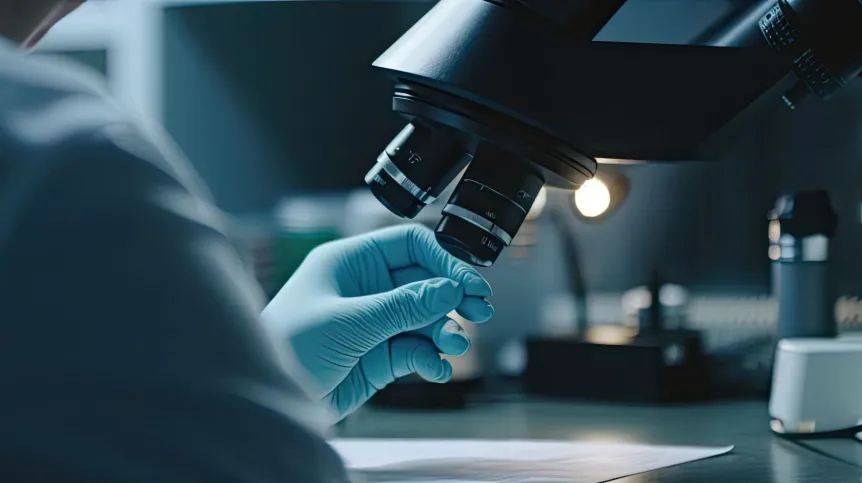
Scientists from the University of Warsaw and the Warsaw University of Life Sciences are developing technology for diagnosing Parkinson's and Alzheimer's diseases in the early stages. The solution will enable the detection of diseases in people who do not yet have symptoms.
The new method for early detection of neurodegenerative diseases (including Parkinson's and Alzheimer's) involves examining the spectrum generated by a laser beam scanning of samples taken from patients.
Spectrum analysis allows scientists to determine whether amyloids (harmful proteins produced as a result of certain diseases) are present in the patient's body. The test also makes it possible to verify the stages of amyloid development, including the earliest ones that do not yet cause health problems. Thanks to this, Parkinson's or Alzheimer's disease can be diagnosed long before symptoms appear.
'Neurodegenerative diseases are most often diagnosed relatively late, when their treatment is difficult and does not bring satisfactory results. This is due to the specificity of these diseases. They can develop for years without any symptoms because the nervous system activates strong defence mechanisms that delay them. Only after exceeding a certain critical mass do these diseases manifest themselves,’ said the author of the new method, Dr. Piotr Hańczyc from the Department of Optics at the Faculty of Physics, University of Warsaw.
He adds that it is important to create a diagnostic method that will make it possible to detect diseases many years before the patient realizes that he or she is sick.
Amyloids have strong properties of accumulating and forming clusters. It is a multi-stage and long-term process. The gradual accumulation of these materials in the nervous system (cerebrospinal fluid, brain and nerves) leads to disruption of the functioning of nerve cells and degeneration of the entire system.
The advantage of the method, say Dr. Hańczyc and his team, is that even the earliest stages of amyloid proteins can be detected in the patient's biological material. Their degeneration can be stopped before cognitive disorders characteristic of neurodegenerative diseases appear.
During the test, laser light passes through the analysed biological material. The sample is stained with fluorescent medical dyes that bind to amyloids. Amyloid cells marked in this way, excited by the laser beam, emit a specific spectrum.
'Amyloids combined with a fluorescent dye emit more light compared to proteins with a normal structure. This difference allows us to clearly determine whether the patient's biological material contains pathogenic proteins, and if so, we can analyse the stage of such proteins. Thanks to this, the doctor will receive specific instructions to implement appropriate therapy or preventive measures,’ says Dr. Hańczyc. He adds that the samples used in this method come from cerebrospinal fluid.
Work is currently underway on technology that will result in a ready-to-implement diagnostic service. The University of Warsaw is developing equipment necessary to conduct tests - a spectroscope with an amplified laser. A team of scientists from the Institute of Information Technology at the Warsaw University of Life Sciences is developing software that will automate the test.
'We focus on developing an innovative solution that uses the latest achievements in artificial intelligence. We plan to create a fully automated inference process based on image data from the spectroscope. The key element is the combination of the knowledge of expert physicists from the University of Warsaw, who specialise in laser spectrometry, and scientists dealing with artificial intelligence,’ says Karol Struniawski from the Institute of Information Technology at the Warsaw University of Life Sciences.
He adds that thanks to this method, doctors performing diagnostics will receive a test result containing a recommendation prepared by artificial intelligence.
'The goal of our project is not only to shorten the analysis time, but also to simplify the entire sample testing process. Thanks to this, it will be possible to use this technology in screening people who do not have symptoms of neurodegenerative diseases,’ says Struniawski.
The transfer of the innovative technology will be carried out by the company Neurolight, established as part of a joint initiative of the University of Warsaw and the Warsaw University of Life Sciences.
Modern medicine has not yet offered the possibility to diagnose Parkinson's and Alzheimer's diseases early. Because these diseases are detected in relatively late stages, doctors usually try to stop their development and alleviate the symptoms, but they cannot reverse their effects. (PAP)
Anna Bugajska
abu/ agt/ kap/
tr. RL













